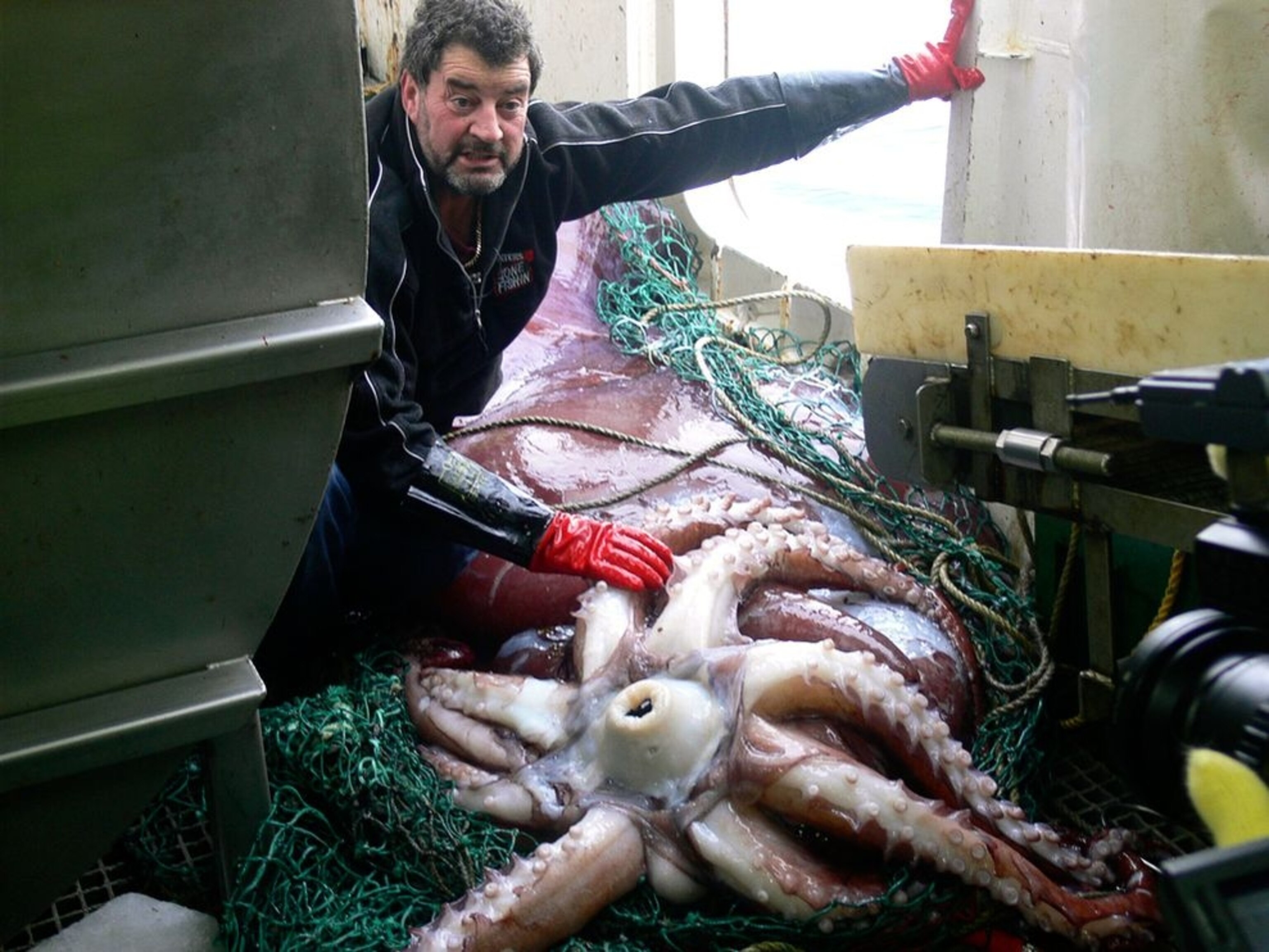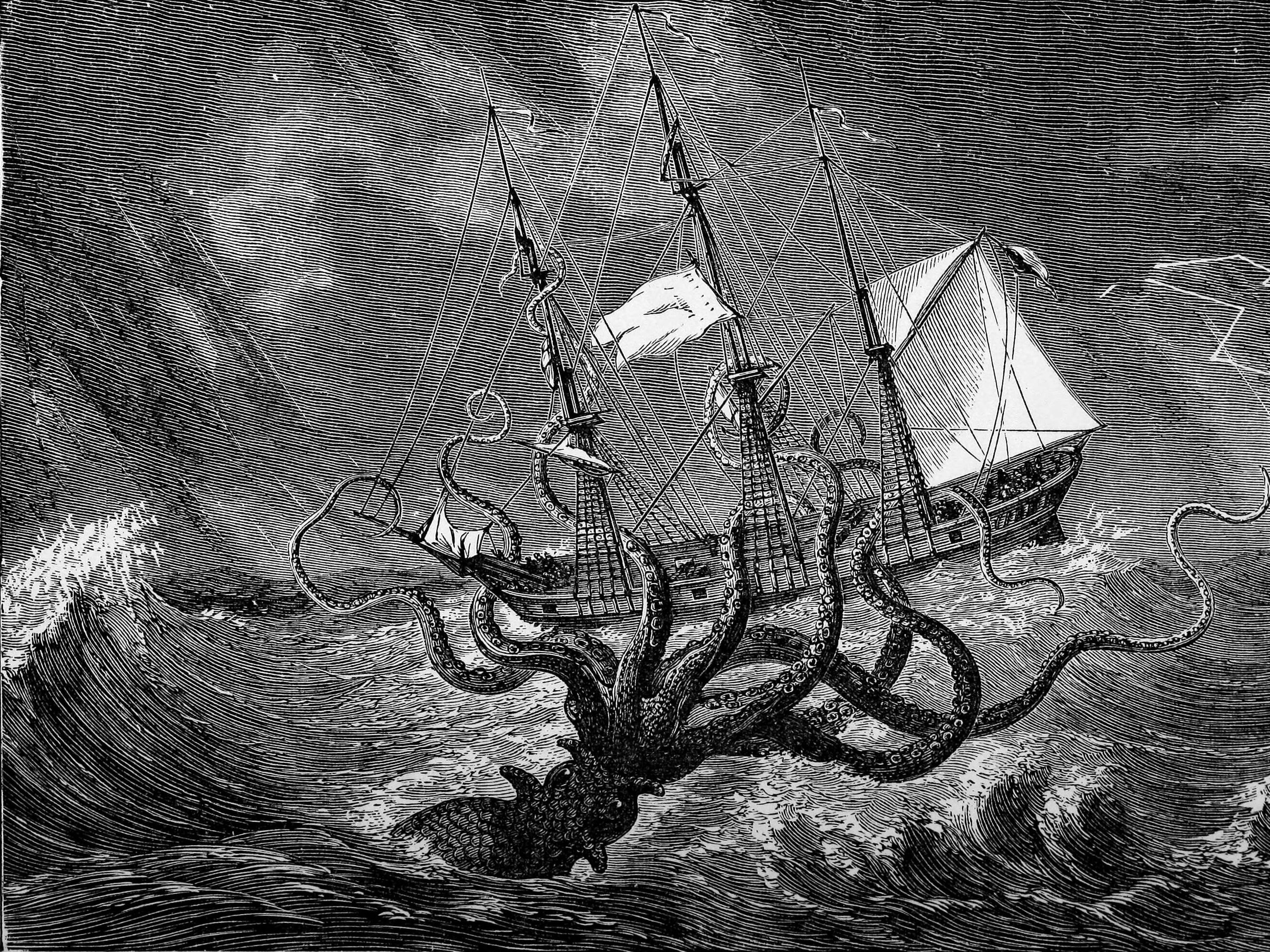
Colossal Squid a Soft, Sluggish Drifter
Perseus would have nothing to fear from this kraken-like sea beast: The squid's energy needs suggest it's just a slow, aimless drifter.
Equipped with a powerful beak, sucker-packed tentacles, and arms lined with razor-sharp claws, the colossal squid (pictures) likely inspired legends of terrible sea monsters, including the ship-wrestling kraken.
But the squid's titanic reputation is slowly being deflated, thanks in part to a new study that says the creature is no more than a sluggish, gelatinous drifter.
The first study of the colossal squid's metabolic system shows that the squid's energy demands likely dictate a slow, aimless existence. The findings match with the initial conclusions of scientists who dissected a captured squid in 2008.
"We already knew it was a kind of gelatinous, soft animal," said marine biologist Rui Rosa of the University of Lisbon in Portugal, who led the study team.
The new data show "not an active or a fearsome predator, but one that has a really slow pace of life."
"Monster" Squid Ambushes Prey
Colossal squid are the world's largest invertebrates, or animals without backbones. The squid are shrouded in mystery: Colossal squid live in Antarctic waters at depths of about 6,560 feet (2,000 meters), and the elusive animals have never been observed alive in the wild.
Investigations of a 30-foot-long (10-meter-long) adult colossal squid caught accidentally off Antarctica in 2007 have been providing scientists with some of their first clues about the deep-sea giants. (See "Colossal Squid Has Glowing 'Cloaking Device,' Huge Eyes.")
For their new study, Rosa and colleagues looked at the physiologies and lifestyles of smaller, related squid species that also live in cold waters.
After scaling up the findings to match the colossal squid's size, the scientists concluded that the animal has a relatively low metabolic rate—in other words, colossal squid take a long time to convert nutrients from their food into energy.
This finding—plus the squid's cold blood and dark, icy home—implies that the colossal squid has generally slow movements and very low food requirements.
The team thinks the colossal squid ekes out an existence as a "sit and float" predator, grabbing the occasional passing fish, or by lying in ambush.
In fact, an 11-pound (5-kilogram) toothfish—known to be a typical meal for colossal squid—could sustain a 1,100-pound (500-kilogram) adult for 200 days, the study team estimates.
"It doesn't really have to consume much prey to maintain its way of life," Rosa said.
Overall, the squid's energy requirements are 300 to 600 times lower than those of warm-blooded whales, the other top predators in Antarctic waters.
And since the squid probably doesn't actively hunt, Rosa added, its dinner plate-size eyes are likely an adaptation for avoiding predators, such as sperm whales and sleeper sharks.
The colossal squid findings were published online last month in the Journal of the Marine Biological Association of the United Kingdom.
Go Further
Animals
- Orangutan seen using plants to heal wound for first timeOrangutan seen using plants to heal wound for first time
- What La Palma's 'lava tubes' tell us about life on other planetsWhat La Palma's 'lava tubes' tell us about life on other planets
- This fungus turns cicadas into zombies who procreate—then dieThis fungus turns cicadas into zombies who procreate—then die
- How can we protect grizzlies from their biggest threat—trains?How can we protect grizzlies from their biggest threat—trains?
Environment
- What La Palma's 'lava tubes' tell us about life on other planetsWhat La Palma's 'lava tubes' tell us about life on other planets
- How fungi form ‘fairy rings’ and inspire superstitionsHow fungi form ‘fairy rings’ and inspire superstitions
- Your favorite foods may not taste the same in the future. Here's why.Your favorite foods may not taste the same in the future. Here's why.
- Are the Great Lakes the key to solving America’s emissions conundrum?Are the Great Lakes the key to solving America’s emissions conundrum?
- The world’s historic sites face climate change. Can Petra lead the way?The world’s historic sites face climate change. Can Petra lead the way?
History & Culture
- Meet the ruthless king who unified the Kingdom of Hawai'iMeet the ruthless king who unified the Kingdom of Hawai'i
- Hawaii's Lei Day is about so much more than flowersHawaii's Lei Day is about so much more than flowers
- When treasure hunters find artifacts, who gets to keep them?When treasure hunters find artifacts, who gets to keep them?
Science
- Why ovaries are so crucial to women’s health and longevityWhy ovaries are so crucial to women’s health and longevity
- Orangutan seen using plants to heal wound for first timeOrangutan seen using plants to heal wound for first time
Travel
- A slow journey around the islands of southern VietnamA slow journey around the islands of southern Vietnam
- Is it possible to climb Mount Everest responsibly?Is it possible to climb Mount Everest responsibly?
- 5 of Uganda’s most magnificent national parks
- Paid Content
5 of Uganda’s most magnificent national parks




